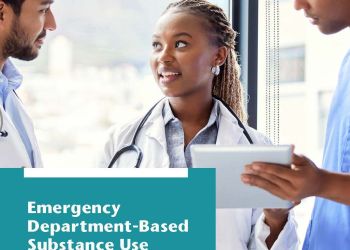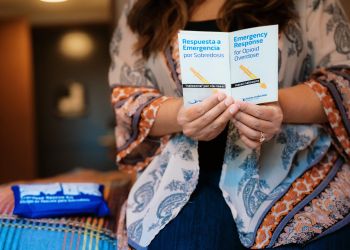Overdose Prevention
As the leading membership organization representing local health departments (LHDs), NACCHO recognizes drug overdose to be a significant public health concern, as well as the critical role that local health departments play in response to such a national emergency. NACCHO supports local health departments in their efforts to respond to the drug crisis through the implementation of evidence-based policies and programs from the prevention and treatment of substance use disorder and its related health consequences.
This short how-to guide instructs LHDs on how to use NACCHO's opioid-focused planning templates.
This resource lists strategies - or "plays" - that communities can replicate or adapt in real-time.
Resource to help address the opioid epidemic on a local level.
Learn what's working in the United States.
NACCHO is engaged in opioid prevention and response efforts in many counties and cities.
Harm Reduction and Academic Detailing
Key Messages
Purpose and Intended Use
The harm reduction and primary care key messages are intended to be guiding points to make when meeting with providers during detailing sessions. They can and should be adapted, as needed, to best meet the needs of the community. For example, detailing visits are more effective when the detailer can clearly highlight and identify relevant data (e.g., local or state overdose data, HIV and Hep C transmission rates, etc.), guidelines (e.g. CDC opioid prescribing or tapering guidelines), and resources (e.g. a list of community organizations offering harm reduction services).
Academic Detailing Aid
Purpose and Intended Use
Similar to the key messages the detailing aid can and should be adapted based on the needs of the community and providers receiving the detailing. This can be used as a comprehensive resource to leave with primary care providers after detailing sessions, or individual sections can be provided as standalone resources to support providers on specific topics that arise during the sessions. Resources included in this aid are:
- Background on the Scope of the Overdose Crisis
- The Overlap between Harm Reduction and Trauma Informed Care
- Driving Factors of Substance Use and the Socio-Ecological Model
- Disproportionately Affected Populations
- Conversations Starters for Providers
- Impact and Outcomes of Harm Reduction Strategies
- Resources/Additional Information
NACCHO has several policy statements related to the Opioid Epidemic and its infectious disease consequences:
NACCHO also provides letters to Congress and the administration to influence policy in order to best support local health departments' response to the opioid epidemic, and advocates for sufficient funding to combat the opioid epidemic.
Legislative Actions
In March 2018, Michael E. Kilkenny, MD, MS Physician Director, Cabell-Huntington (WV) Health Department testified before the House Energy and Commerce Health Subcommittee in a hearing "Combating the Opioid Crisis: Prevention and Public Health Solutions." Watch the full video to see Dr. Kilkenny describe how his health department has successfully led community efforts to combat the dual epidemics of opioid misuse and infectious diseases associated with opioid addiction, or read NACCHO's recap of the hearing on Twitter.
On November 13, 2017, NACCHO hosted a Congressional briefing "Tackling the Opioid Epidemic and its Hidden Casualties: Local Health Departments on the Frontlines" with cosponsors National Association of Counties and U.S. Conference of Mayors, with panelists that represented a range of local stakeholders in the fight against opioid use and abuse.
If you have a resource you’d like to share, questions to ask, or you’d like to learn more and be part of the conversation around local response to the opioid epidemic, please complete the following form.
Overdose Prevention Blog
Community Health Program
Emily Winkelstein
Director, Overdose Prevention
JavaScript is required to reveal this message. / Email
Community Health Program
Anistia Rugama
Lead Analyst, OD Prevention
JavaScript is required to reveal this message. / Email
Community Health Program
Francis Higgins
Senior Program Analyst, Overdose Prevention
JavaScript is required to reveal this message. / Email
Community Health Program
Audrey Eisemann
Senior Program Analyst, Overdose, Injury, and Violence Prevention
JavaScript is required to reveal this message. / Email
Community Health Program
Lane Davis
Senior Program Analyst, Overdose Prevention
JavaScript is required to reveal this message. / Email
Community Health Program
Madeline Masog
Program Analyst, Overdose Prevention
JavaScript is required to reveal this message. / Email
Community Health Program
Bailey McInnes
Program Analyst, Overdose Prevention
JavaScript is required to reveal this message. / Email








